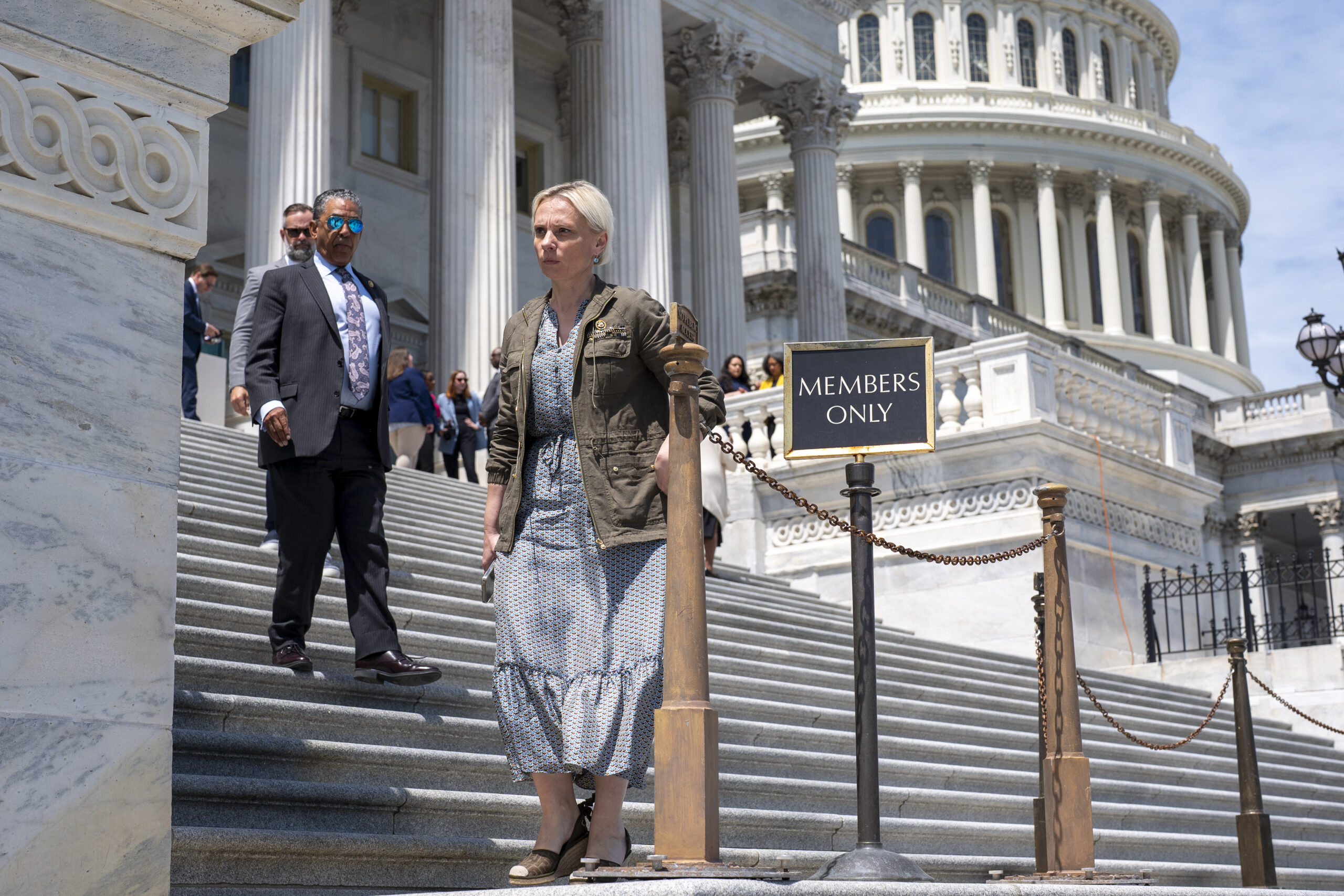

Polls are closed in the Hoosier State on Tuesday that will decide competitive contests for governor and Congress.
While the race for the White House was on the top of the ballot in Indiana’s presidential and state primaries, President Joe Biden and former President Donald Trump already had enough delegates to secure their respective parties’ presidential nominations.
Both have won nearly every primary and caucus by large margins. Indiana had 58 Republican delegates and 79 Democratic delegates up for grabs in its presidential primaries.
While Trump is the only active candidate in the GOP primary, former United Nations Ambassador Nikki Haley was still on the ballot. In recent contests, she has continued to receive a share of the vote even though she suspended her campaign in early March. During the Pennsylvania primary on April 23, Haley received almost 17% of the vote, although Trump still won with 83% of the ballots cast.
Indiana isn’t expected to be a competitive state in the presidential election, with Trump carrying the state twice with 57% of the vote. Only two Democrats have won the Hoosier State in the last 21 presidential elections, Lyndon Johnson in 1964 and Barack Obama in 2008.
Most of the action will be centered on gubernatorial and congressional GOP primaries up and down the ballot. This election cycle is set to bring a new wave of leadership, which includes a six-way primary for governor and crowded races for several open congressional seats, in what has become a game of political musical chairs. The number of open races has driven a historic number of GOP contenders.
The ruby-red state features only one competitive House race in the general election when control of both the Senate and House will be decided.
Results:
President
In the Republican presidential primary, Trump defeated Haley, 76.3% to 23.7%, with 15% of the votes counted. The Associated Press called the race at 7:00 p.m. Eastern time. There are 58 delegates at stake for Trump, and he will receive the majority of the state’s delegates.
President Joe Biden won all of Indiana’s 79 pledged Democratic delegates on Tuesday since he is the sole option in the Democratic primary. Indiana voters weren’t able to cast their votes for another candidate or for “uncommitted.”
Governor
Sen. Mike Braun (R-IN) won the GOP primary for the governor’s race, with the Associated Press calling the race right after polls closed at 7:00 p.m. Braun had 38.9% of votes with 14% of votes counted.
The top statewide race on the ballot is the primary for governor, which has become the focus of a record amount of spending. Six Republicans faced off to be the Republican nominee for governor, as Gov. Eric Holcomb (R-IN) is term-limited after serving eight years in office.
Beyond Braun, the field included Lt. Gov. Suzanne Crouch, former state Commerce Secretary Brad Chambers, former state Attorney General Curtis Hill, former state economic official Eric Doden, and conservative activist Jamie Reitenour.
Indiana’s airwaves have been blanketed in ads, with the six Republicans spending about $40 million by Election Day, a record amount of campaign spending in an Indiana primary. Braun spent $6 million in the first three months of the year. Crouch, Chambers, and Doden spent $14 million together.
The state has now seen a record-breaking $98 million spent ahead of the primaries, according to AdImpact. About 46% of that cash has been spent on Indiana’s gubernatorial primary, while 49% has been spent on House and down-ballot races.
It’s been two decades since Indiana has elected a Democratic governor.
SOCIAL SECURITY: WHAT YOU NEED TO KNOW AND HOW LONG IT WILL LAST
Senate
Republicans have coalesced behind Rep. Jim Banks (R-IN) after Braun announced he would run for governor. The Indiana congressman will face Democratic candidate Valerie McCray, who won the Democratic primary, with the Associated Press calling the race at 7:00 p.m. McCray held 65.5% of votes with 12% of votes counted.
9th Congressional District
Incumbent Rep. Erin Houchin (R-IN), who has held the seat for one term, won the GOP primary, defeating Hugh Doty, 81% to 19%, with 16% of the votes counted after the Associated Press called the race at 7:09 p.m.
Trump recently endorsed Houchin who will take on Democrat Timothy Peck, who defeated D. Liam Dorris in the Democratic primary, 67.7% to 32.3%, with 24% of votes counted after the Associated Press called the race at 7:16 p.m.
4th Congressional District
Incumbent Rep. Jim Baird (R-IN) won a GOP primary, with 66% of the vote after the Associated Press called the race at 7:26 p.m., with 16% of the vote counted. Baird faced a challenge from veteran Charles Bookwalter who received 24.8% of the vote and John Piper who received 9.1% of ballots cast.
Yet to be called: On the Democratic side, retired Marine Derrick Holder and business owner Rimpi Girn are competing for the nomination.
8th Congressional District
State Sen. Mark Messmer won the GOP primary to fill retiring Rep. Larry Buschon’s (R-IN) seat, with 39.9% of the vote after the Associated Press called the race at 7:46 p.m., with 53% of the vote counted.
Messmer faced a crowded primary, but overwhelmingly prevailed over candidates like former Rep. John Hostettler, who received 16.5% of the vote, surgeon Richard Moss who had 15.1% and Dominick Kavanaugh, a former Trump official, who received 11.6% support. Owen County Republican Kristi Risk came in at 10%, Luke Misner received 3.1%, Jim Case came in at 2.7% and Jeremy Heath received 1.1% of the vote.
Outside groups spending against Hostettler may have made an impact. There was $5.6 million spent in the race, including $2.8 million against Hostettler. A super PAC affiliated with the American Israel Public Affairs Committee paid for a 30-second ad that hits Hostettler for voting against a 2000 resolution expressing support for Israel and condemning Palestinian leaders over the violence of the second intifada. The ad also cited his numerous votes against providing military aid to Israel. A group aligned with the Republican Jewish Coalition spent $955,000 in support of Messmer.
3rd Congressional District
Democrat Kiley Adolph, a former professor and nonprofit vice president, won the Democratic primary, with 63.5% of the vote after the Associated Press called the race at 7:59 p.m. Adolph defeated Phil Goss, an entrepreneur and farmer who received 36.5% of the vote.
Yet to be called: Based in Fort Wayne, this district in the northeastern part of the state has a crowded primary to succeed Rep. Jim Banks, who is running for Senate. The race includes Tim Smith, who leads a “Christ-center family services provider,” according to his campaign website, Former Allen County Circuit Judge Wendy Davis, state Sen. Andy Zay, and former Rep. Marlin Stutzman. The race also includes construction project manager Grant Bucher, veteran and congressional staffer Jon Kenworthy, manufacturing worker Eric Whalen, and maintenance technician Mike Felker.
Smith has received the most in campaign contributions, raising $1.3 million, per Federal Election Commission data. However, Smith loaned himself $1.1 million.
7th Congressional District
Incumbent Democrat André Carson (D-IN) won the Democratic primary with 91.6% of the vote after the Associated Press called the race 8:05 p.m., with 44% of the vote counted. Carson faced a primary and defeated Curtis Godfrey, who received 5.3% of the vote, and Pierre Pullins, who came in third with 3.1% support.
Yet to be called: Republican candidates include Catherine Ping, a retired Army lieutenant, Philip Davis, a retired postal worker, and Gabe Whitley, a former candidate for Evansville mayor.
Races to watch:
1st Congressional District
Republicans are once again working to defeat Rep. Frank Mrvan (D-IN) in northwest Indiana, which has trended more red over the last decade. Businessman Mark Leyva is running against Lake County Councilman Randy Niemeyer and business owner David Ben Ruiz. The Cook Political Report ranks the race as Lean Democrat.
2nd Congressional District
Rep. Rudy Yakym (R-IN) is the incumbent in the district after he won an election in 2022 following the death of Rep. Jackie Walorski (R-IN). In the general election, Yakym will face Democrat Lori A. Camp, who works at a small software firm in South Bend. Both Yakym and Walorski are running uncontested in the Indiana primary on Tuesday.
5th Congressional District
This is perhaps the most interesting race to watch after incumbent Rep. Victoria Spartz’s (R-IN) initial decision to retire set off a crowded primary and one of the most expensive campaigns this cycle. She ultimately decided to run and is fighting for her political life.
Spartz is facing state Rep. Chuck Goodrich, businessman and speech pathologist Raju Chinthala, Max Engling, attorney Mark Hurt, CPA Patrick Malayter, Matthew Peiffer, Larry Savage, and veteran L.D. Powell. Recent polling averages show a close race between Spartz and Goodrich.
Spartz, the first and only Ukrainian-born member of Congress, was a supporter of aid when Russia first invaded the country two years ago. She has recently opposed an aid package for the country and has criticized Ukrainian President Volodymyr Zelensky. Goodrich has launched attack ads against Spartz for her support for Ukraine aid.
The results of the primary could give an indication of how divisions over Ukraine aid could affect GOP primaries moving forward.
CLICK HERE TO READ MORE FROM THE WASHINGTON EXAMINER
6th Congressional District
Rep. Greg Pence, the brother of former Indiana Gov. and Vice President Mike Pence, announced he would not be seeking reelection. Seven Republicans made the ballot to take over the safe GOP district.
The race includes wealthy businessman Jefferson Shreve, state Rep. Mike Speedy, state Sen. Jeff Raatz, state Rep. John Jacob, Jamison Carrier, Wayne County Republican Darin Childress, and businessman Bill Frazier. The winner will face Democrat Cynthia Wirth, who is running unopposed.
Shreve has put $5.6 million into his campaign, while Speedy loaned himself $1.5 million, and Carrier contributed $750,000, according to campaign finance records.




